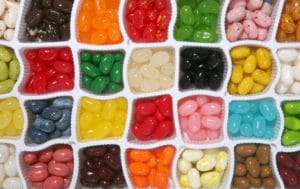Woman Sues Jelly Belly Because Jelly Beans Contain Sugar
People sue large companies all the time, and they do so for a number of different reasons. In some cases, the issues that they have with the company are valid, and those cases will often be settled out of court. Other times, people sue large companies for reasons that most would think are not actual problems, and more a matter of common sense and reading packaging or instructions thoroughly. Sometimes, things can seem a little more confusing.
Why Did Jelly Belly Get Sued?
In this particular case, a woman named Jessica Gomez from San Bernardino County in California filed a case against the popular candy Jelly Belly. She claimed that they were falsely advertising a product called Sports Beans, which she believed were being advertised as a source of energy that athletes could use.
She says that the company had tricked her into believing that the jelly beans contained juice instead of sugar. The package listed evaporated cane juice as one of the ingredients, which many people would understand to mean that it is made from sugar. However, Gomez says that the company instead focused on the other elements in the beans, namely vitamins, electrolytes, and carbohydrates. She believed and filed in the court documents that it was false advertising because the company was suggesting that the jelly beans were somehow healthy.
The information on the packaging does say that a single serving of the candy will include 17 grams of sugar. The problem stems from the fact that the company was also using the aforementioned term of evaporated cane juice as a means to describe what was actually sugar.
The FDA does not have a legal requirement when the term evaporated cane juice is used, but they have advised companies that it is better to simply call it sugar since that’s what it is. There have actually been other cases that have revolved around different terms for sugar.
What Was the Outcome of the Case?
Jelly Belly themselves said that the lawsuit was essentially nonsensical when they submitted a motion to the court. They said that any reasonable consumer would have been able to understand what was on the packaging since in addition to the evaporated cane juice listed in the ingredients, there was also sugar listed on the nutritional information panel. They wanted the courts to drop the case.
It turns out that the courts ended up agreeing with Jelly Belly. They dismissed the case when Gomez was not able to show any facts that were specific to the purchase or that relied on the advertising of the product. Was this a case of a frivolous lawsuit where someone thought that they might be able to make some money from a large company, or was it a matter of not reading and understanding the packaging until after buying and using the product?
Regardless, you can be sure that there will be plenty of similar lawsuits that come up year after year.
A Lesson to Consumers
This isn’t to say that there aren’t deceptive practices that happen with advertising and packaging because there certainly are. However, not all cases like this are a large company trying to pull the wool over someone’s eyes. Sugar was clearly labeled on the nutritional information of the packaging in this instance. It should be a lesson to people out there that they should always read and completely understand any products that they purchase whether it is candy or anything else. Being an informed consumer can cut down on these types of cases, so when there are real issues, they will be taken more seriously.

